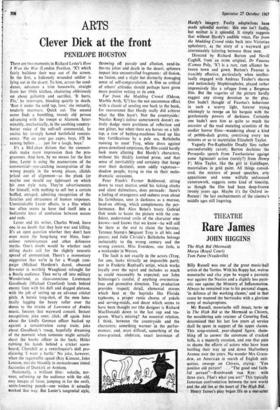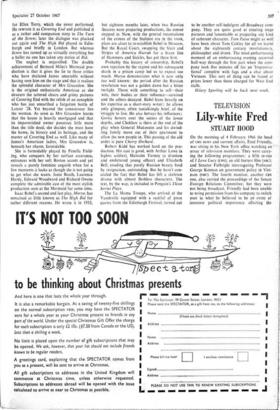THEATRE
Rare James
JOHN HIGGINS
The High Bid (Mermaid) Marya (Royal Court) Tom Paine (Vaudeville)
Billy Russell was one of the great music-hall artists of the 'forties. With his floppy hat, walrus moustache and clay pipe he waged a patriotic war against the Nasties and a slightly less patri- otic one against the Ministry of Inflammation. Always he remained true to his personal slogan, `in defence of the working classes,' and in that cause he manned the barricades with a glorious army of malapropisms.
Mr Russell, moustache still intact, turns up in The High Bid at the Mermaid as Chivers, the mouldering sole retainer of Covering End, determined that his last few years of service shall be spent in support of the upper classes. This soup-stained, pear-shaped figure, sham- bling off to answer the summons of cracked bells, is a masterly creation, and one that puts to shame the efforts of actors who have been buttling their way up and down Shaftesbury Avenue over the years. No wonder Mrs Grace- dew, an American in search of English anti- quities, swoops on Chivers, crying: 'You positive old picture! . . . "The good and faith- ful servant"—Rembrandt van Ryn: with three stars. That's what you are!' This typically Jamesian confrontation between the new world and the old lies at the heart of The High Bid. . Henry-James's play began life as a one-acter for Ellen Terry, which she never performed. He rewrote it as Covering End and published it as a rather odd companion story to The Turn of the Screw; later the dialogue was plucked out again and The High Bid played in Edin- burgh and briefly in London. But whereas Screw has turned up as virtually everything but a ballet no one has taken any notice of Bid.
The neglect is unjustified. The double achievement of Bernard Miles's Mermaid pro- duction is that it gives the lie to those critics who have declared James unactable without having seen him on the stage and that it realises the splendid character of Mrs Gracedew. She is the original enthusiastic American as she devours the tattered chairs and grimy pictures of Covering End with the relish of an oenophile who has just unearthed a forgotten bottle of Latour '28. Yet beyond the connoisseur lies the woman. As soon as Mrs Gracedew learns that the house is heavily mortgaged and that its impoverished owner possesses little more than the title deed, she decides she must have the home, its history and its heritage, and the master of Covering End as well. Like many of James's American ladies, Mrs Gracedew is, beneath her charm, formidable.
She is formidably played by Fenella Field- ing, who conquers by her surface assurance, entrances with her soft Boston accent and yet reveals a purely feminine anguish when for a few moments it looks as though she is not going to get what she wants. Janie Booth, Laurence Hardy, Edward Woodward and Richard Owens complete the admirable cast of the most stylish production seen at the Mermaid for some time.
Isaac Babel's second and last play, Marya, has remained as little known as The High Bid for rather different reasons. He wrote it in 1933, but eighteen months later, when two Russian theatres were preparing productions, the censor stepped in. Now, with the general recantations of the crimes of the Stalinist era in the ussit, plans are afoot to re-establish Babel in Moscow. But the Royal Court, swapping the Stars and Stripes of America Hurrah for a brave line of Hammers and Sickles, has got there first.
Probably this history of censorship, Babel's own rejection by the regime and his subsequent death in a prison camp led us to expect too much. Marya demonstrates what is now only too well known: the period after the Russian revolution was not a golden dawn but a bitter twilight. Those with something to sell—their wits, their bodies or their influence—survived and the others decayed. Babel leans heavily on his expertise as a short-story writer: he allows only glimpses, often tantalisingly brief, of the struggle to live. He also betrays his influences: Gorky hovers over the scenes of the lower depths, and Chekhov is there at the end of the play when General Mukovnin and his dwind- ling family move out of their apartment to allow the new people in. This passing of the old order is pure Cherry Orchard.
Robert Kidd has worked hard on the pro- duction. His cast is good, with Arthur Lowe (a legless soldier), Malcolm Tierney (a drunken and embittered young officer) and Elizabeth Bell, exuding that purely Russian beauty bred by resignation, outstanding. But he hasn't con- cealed the fact that Babel has left a skeleton drama with almost fleshless characters. The text, by the way, is included in Penguin's Three Soviet Plays.
The La Mama Troupe, who arrived at the Vaudeville equipped with a sackful of press quotes from the Edinburgh Festival, turned out
to be another self-indulgent off-Broadway com- pany. They are quite good at creating stage pictures and lamentable at projecting any kind of coherent character. Torn Paine might as well have been about Tom Cobley for all we learnt about the eighteenth century revolutionary, philosopher and drunk. The most embarrassing moment of an embarrassing evening occurred half-way through the first part when the com- pany took five minutes off for an 'Improvisa- tional' complete with fags and a chat about Vietnam. This sort of thing can be found at prices lower than those charged for West End stalls.
Hilary Spurling will be back next week.











































 Previous page
Previous page